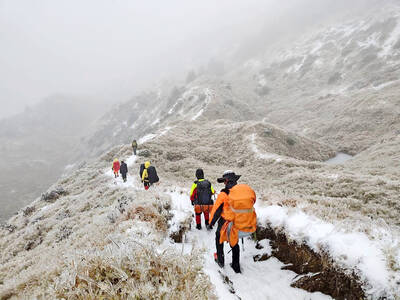The nation’s two World War II-era submarines are undergoing major renovations to upgrade their capabilities, but the Navy and the contractor might dismantle one to gain sub-building experience and study the manufacturing techniques, Minister of National Defense Kao Kuang-chi (高廣圻) said yesterday.
Kao made the remarks in response to questions from legislators yesterday regarding upgrades on the 70-year-old subs.
The upgrades are being undertaken at the Navy’s shipyard and by the China Shipbuilding Corp (CSBC) in Kaohsiung Harbor.
The US-built Hao Si (海獅, sea lion) and Hai Pao (海豹, seal) have been derided as antiques worthy of display in a naval museum.
However, both are still on active duty, a situation that critics contend highlights the nation’s struggle to modernize its submarine fleet, and also accents the navy’s lack of knowledge about new submarine technology.
Kao denied recent news reports that CSBC was looking to cancel its contract for the maintenance and renovation of the subs.
“The work to upgrade the submarines is still ongoing — it was not canceled — but we have to discuss the matter with CSBC to clarify the issues,” Kao said.
The ministry still plans to bolster the navy with new submarines, either purchasing them from foreign nations, or developing an indigenous sub program, he said.
“If we can get assistance and technical support from other nations, then I will support building the submarines ourselves,” Kao said.
Some legislators voiced concern that CSBC lacks experience in the maintenance and repair of submarines and has few qualified technicians, saying that the reassembly of a dismantled sub could be problematic.
Kao replied the major renovations and upgrades are under way, and if CSBC and the naval docks are unable to reassemble the submarines, then one submarine would be refurbished while the other is used to develop insight into the technology involved.
Vice Admiral Shang Jung-chiang (尚永強), assistant chief of staff for logistics at the ministry’s General Staff Headquarters, said CSBC has been reluctant to provide a cost estimate for the tender because of problems with the submarines’ stern and the hull’s oval structure.

Trips for more than 100,000 international and domestic air travelers could be disrupted as China launches a military exercise around Taiwan today, Taiwan’s Civil Aviation Administration (CAA) said yesterday. The exercise could affect nearly 900 flights scheduled to enter the Taipei Flight Information Region (FIR) during the exercise window, it added. A notice issued by the Chinese Civil Aviation Administration showed there would be seven temporary zones around the Taiwan Strait which would be used for live-fire exercises, lasting from 8am to 6pm today. All aircraft are prohibited from entering during exercise, it says. Taipei FIR has 14 international air routes and

The Ministry of National Defense (MND) today released images of the military tracking China’s People's Liberation Army (PLA) movements during the latest round of Chinese drills around Taiwan. The PLA began "Justice Mission 2025" drills today, carrying out live-fire drills, simulated strikes on land and maritime targets, and exercises to blockade the nation's main ports. The exercises are to continue tomorrow, with the PLA announcing sea and air space restrictions for five zones around Taiwan for 10 hours starting from 8:30am. The ministry today released images showing a Chinese J-16 fighter jet tracked by a F-16V Block 20 jet and the

Snow fell on Yushan (Jade Mountain, 玉山) yesterday morning as a continental cold air mass sent temperatures below freezing on Taiwan’s tallest peak, the Central Weather Administration (CWA) said. Snowflakes were seen on Yushan’s north peak from 6:28am to 6:38am, but they did not fully cover the ground and no accumulation was recorded, the CWA said. As of 7:42am, the lowest temperature recorded across Taiwan was minus-5.5°C at Yushan’s Fengkou observatory and minus-4.7°C at the Yushan observatory, CWA data showed. On Hehuanshan (合歡山) in Nantou County, a low of 1.3°C was recorded at 6:39pm, when ice pellets fell at Songsyue Lodge (松雪樓), a

NO SHAME IN RETREAT: Hikers should consider turning back if the weather turns bad or if they do not have sufficient equipment, the Taroko park headquarters said Two people died of hypothermia over the weekend while hiking on Hsuehshan (雪山), prompting park authorities to remind hikers to bring proper equipment and consider their physical condition before setting out in the cold weather. Temperatures dropped over the weekend, bringing snow to high altitudes in Shei-pa National Park. One hiker, surnamed Lin (林), who on Friday was traveling with a group of six along the Hsuehshan west ridge trail, lost consciousness due to hypothermia and died, the Shei-pa National Park Headquarters said. On Saturday, another hiker, surnamed Tien (田), in a group of five on the southeast of the west